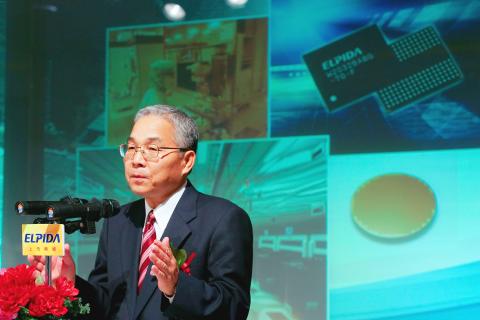Elpida Memory Inc, the world’s third-largest computer chipmaker, opened higher on its debut on the Taiwanese exchange yesterday, but closed off the day’s high after announcing it had scrapped plans to merge with Taiwanese chipmakers following opposition from the target companies.
The stock, in the form of Taiwan depositary receipts (TDR), closed up 1.88 percent at NT$21.70 from its issue price of NT$21.30. At one time, it reached as high as NT$22.15. Each TDR represents 0.05 of the common shares of the Tokyo-based company.
On the Tokyo Stock Exchange, Elpida shares jumped 6.38 percent to end at ¥1,216 each after its president and chief executive, Yukio Sakamoto, said on Thursday the company planned to hike chip prices next month.

Photo: Maurice Tsai,. Bloomberg
The performance of other Taiwanese DRAM stocks was lackluster in comparison, with ProMOS Technologies Inc (茂德科技) closing unchanged at NT$2.05, Powerchip Technology Corp (力晶科技) rising 1.28 percent to NT$6.33 and Nanya Technology Corp (南亞科技) inching up 0.3 percent to NT$15.85.
Elpida announced last year that it was buying stakes in Taiwanese chipmakers to consolidate and counter competition from market leader Samsung Electronics Co.
However, “most Taiwan DRAM companies’ presidents don’t want integration,” Sakamoto said yesterday in Taipei. “We’re better having many product lines with Taiwan DRAM companies.”
Elpida is still considering buying a stake in ProMOS, Sakamoto said.
The company also plans to work with Taiwanese companies to enter China, he said without elaborating.
“We 100 percent agree to jointly move into China, because if we move into China by ourselves, we’ve a 99.99 percent chance to fail,” Sakamoto said.
Elpida has a joint venture and outsourcing agreements with Powerchip, and the TDR issue would help deepen alliances in Taiwan, Sakamoto said.
“The market will view positively signs of ongoing DRAM industry consolidation, with the DRAM capacity of weaker players like Powerchip being progressively withdrawn from the supply picture,” Macquarie Research said in a report last month.
“Powerchip’s diminishing presence was already assumed by most observers and likely discounted into Elpida’s shares,” it said.
Elpida, however, will be a full beneficiary of the DRAM industry’s favorable outlook this year, thanks to catalysts such as demand from growing smartphone and tablet computer sales, it added.
Elpida raised NT$4.2 billion (US$141.2 million) in the TDR listing, which it said would be channeled into the development and production of cutting-edge 20 and 30-nanometer chips.
The TDR listing is the first by a Japanese company and the 24th by a foreign-registered company.
Taiwan Stock Exchange chairman Schive Chi (薛琦) said yesterday he would visit Japan next month to promote TDR listing by more Japanese firms.
Stock exchange statistics show that 47 local companies are planning to launch initial public offerings in Taiwan this year, while 15 to 20 foreign companies are expected to list their shares on the main board.

SEEKING CLARITY: Washington should not adopt measures that create uncertainties for ‘existing semiconductor investments,’ TSMC said referring to its US$165 billion in the US Taiwan Semiconductor Manufacturing Co (TSMC, 台積電) told the US that any future tariffs on Taiwanese semiconductors could reduce demand for chips and derail its pledge to increase its investment in Arizona. “New import restrictions could jeopardize current US leadership in the competitive technology industry and create uncertainties for many committed semiconductor capital projects in the US, including TSMC Arizona’s significant investment plan in Phoenix,” the chipmaker wrote in a letter to the US Department of Commerce. TSMC issued the warning in response to a solicitation for comments by the department on a possible tariff on semiconductor imports by US President Donald Trump’s

The government has launched a three-pronged strategy to attract local and international talent, aiming to position Taiwan as a new global hub following Nvidia Corp’s announcement that it has chosen Taipei as the site of its Taiwan headquarters. Nvidia cofounder and CEO Jensen Huang (黃仁勳) on Monday last week announced during his keynote speech at the Computex trade show in Taipei that the Nvidia Constellation, the company’s planned Taiwan headquarters, would be located in the Beitou-Shilin Technology Park (北投士林科技園區) in Taipei. Huang’s decision to establish a base in Taiwan is “primarily due to Taiwan’s talent pool and its strength in the semiconductor

An earnings report from semiconductor giant and artificial intelligence (AI) bellwether Nvidia Corp takes center stage for Wall Street this week, as stocks hit a speed bump of worries over US federal deficits driving up Treasury yields. US equities pulled back last week after a torrid rally, as investors turned their attention to tax and spending legislation poised to swell the US government’s US$36 trillion in debt. Long-dated US Treasury yields rose amid the fiscal worries, with the 30-year yield topping 5 percent and hitting its highest level since late 2023. Stocks were dealt another blow on Friday when US President Donald

UNCERTAINTY: Investors remain worried that trade negotiations with Washington could go poorly, given Trump’s inconsistency on tariffs in his second term, experts said The consumer confidence index this month fell for a ninth consecutive month to its lowest level in 13 months, as global trade uncertainties and tariff risks cloud Taiwan’s economic outlook, a survey released yesterday by National Central University found. The biggest decline came from the timing for stock investments, which plunged 11.82 points to 26.82, underscoring bleak investor confidence, it said. “Although the TAIEX reclaimed the 21,000-point mark after the US and China agreed to bury the hatchet for 90 days, investors remain worried that the situation would turn sour later,” said Dachrahn Wu (吳大任), director of the university’s Research Center for